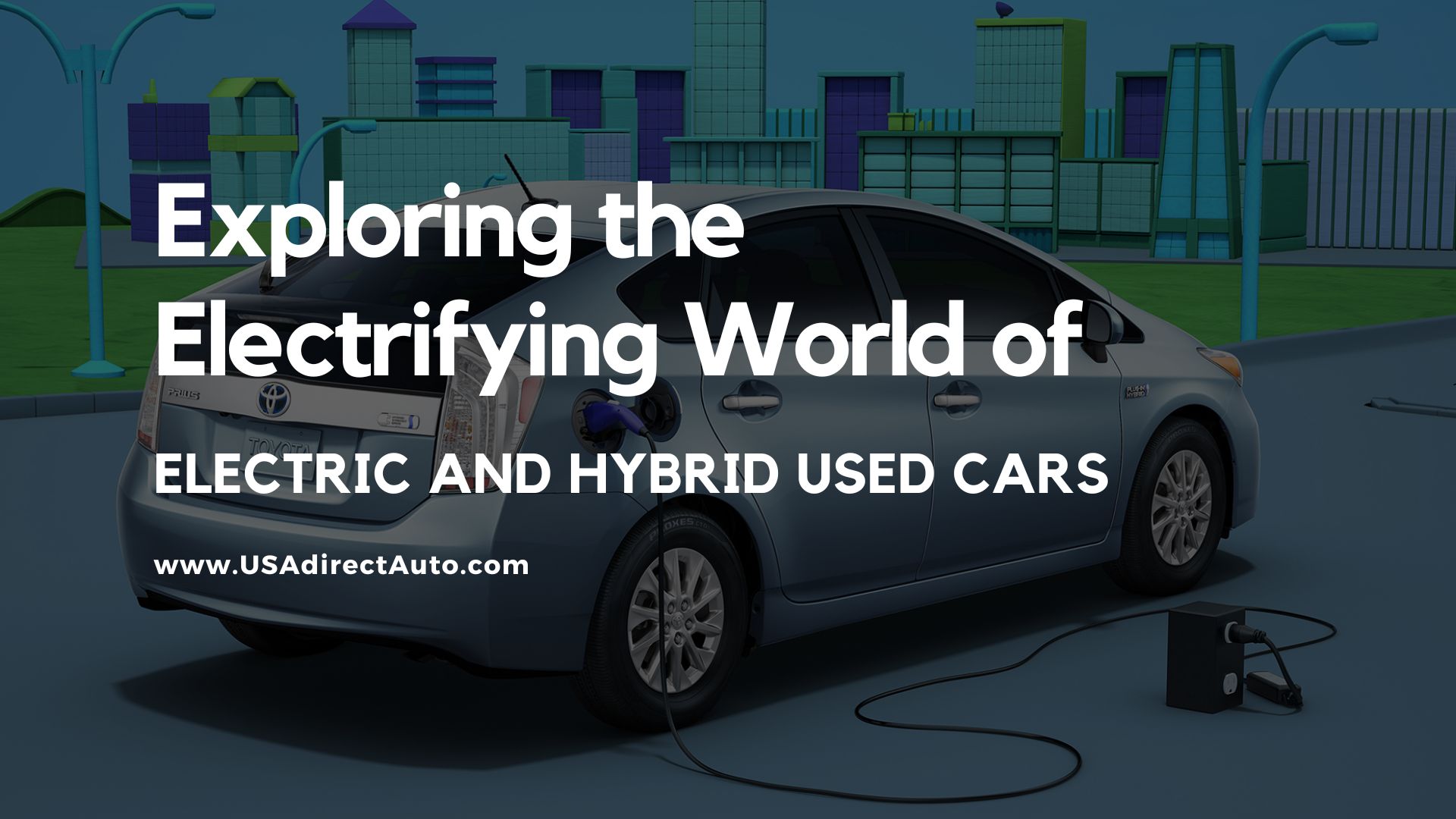-
1Personal Info
-
2Address Info
-
3Income Info
-
4Vehicle Info
-
5Review
Exploring the Electrifying World of Electric and Hybrid Used Cars

In an era of increasing environmental consciousness and fluctuating fuel prices, electric and hybrid used cars have gained significant attention and popularity among car buyers. These vehicles offer a greener alternative to traditional gasoline-powered cars while providing unique advantages. In this article, we will delve into the fascinating world of electric and hybrid used cars, exploring their intriguing features, benefits, and some lesser-known facts that make them stand out in the automotive landscape.
The Rise of Electric and Hybrid Vehicles
The transition to electric and hybrid vehicles represents a pivotal moment in the automotive industry’s history. Although electric cars have been around since the 19th century, it’s only in recent years that they have gained mainstream acceptance. The surge in environmental awareness, advancements in battery technology, and government incentives for eco-friendly vehicles have all played a crucial role in this transformation.
Hybrid vehicles, which combine a gasoline engine with an electric motor, have been a bridge between traditional and electric cars. They offer improved fuel efficiency and reduced emissions, making them an attractive option for environmentally conscious consumers. On the other hand, pure electric vehicles (EVs) run solely on electricity, emitting zero tailpipe emissions.
Sustainability and Environmental Impact
One of the most compelling aspects of electric and hybrid vehicles is their positive impact on the environment. When compared to conventional gasoline-powered cars, these vehicles produce significantly fewer greenhouse gas emissions. In fact, EVs produce no tailpipe emissions at all, making them a vital component in the fight against climate change.
Moreover, the production of electric and hybrid cars is becoming increasingly sustainable. Automakers are investing in eco-friendly manufacturing processes, using recycled materials, and reducing waste in their production facilities. As a result, choosing a used electric or hybrid car not only reduces your carbon footprint but also supports sustainable manufacturing practices.
Long-Term Cost Savings
While electric and hybrid vehicles may have a higher upfront purchase price compared to their gasoline counterparts, they often offer substantial long-term cost savings. Here’s how:
Fuel Efficiency: Electric and hybrid cars are incredibly efficient when it comes to energy consumption. Charging an EV is generally cheaper than refueling a gas car, and hybrid vehicles offer improved fuel economy, reducing the frequency of trips to the gas station.
Maintenance: Electric and hybrid vehicles have fewer moving parts compared to traditional internal combustion engines. This results in lower maintenance costs over the life of the vehicle. You won’t need oil changes, and the brakes tend to last longer due to regenerative braking systems.
Tax Incentives and Rebates: Many governments offer tax incentives and rebates to encourage the purchase of electric and hybrid vehicles. These financial incentives can help offset the initial higher cost.
Resale Value: Electric and hybrid cars often have strong resale value, making them a sound investment for the future.
Range and Charging Infrastructure
Concerns about electric vehicle range have been a significant barrier for some potential buyers. However, the industry has made significant progress in this area. Modern EVs have increasingly longer ranges on a single charge, with some models exceeding 300 miles. This range is more than sufficient for daily commuting and most long-distance trips.
Additionally, the charging infrastructure for electric vehicles has expanded dramatically. Charging stations can be found in urban areas, along highways, and even in rural locations. Fast-charging stations can replenish a significant portion of an EV’s battery capacity in a matter of minutes, making long road trips feasible. As the charging network continues to grow, range anxiety becomes less of a concern.
Variety of Models and Features
The electric and hybrid car market is no longer limited to a handful of models. Today, consumers have a wide range of options to choose from, including compact cars, SUVs, luxury vehicles, and even sports cars. This diversity means that there is likely an electric or hybrid vehicle that suits your needs and preferences, whether you’re looking for a family-friendly SUV or a sporty coupe.
Moreover, these vehicles come equipped with a plethora of advanced features. Many electric and hybrid cars offer cutting-edge technology, including touchscreen infotainment systems, adaptive cruise control, lane-keeping assistance, and autonomous driving capabilities. These features enhance both the driving experience and safety.
Battery Technology Advancements
The heart of any electric or hybrid vehicle is its battery. Over the years, there have been significant advancements in battery technology, leading to improvements in performance, range, and longevity. Lithium-ion batteries, the most common type in use today, have become more efficient and cost-effective.
Moreover, ongoing research and development are focused on solid-state batteries, which promise even greater energy density and faster charging times. As these technologies continue to evolve, electric and hybrid cars will become more accessible and practical for a broader range of consumers.
Second-Hand Electric and Hybrid Cars
One of the most exciting aspects of the electric and hybrid revolution is the emergence of the used car market for these vehicles. Buying a used electric or hybrid car offers several advantages:
Affordability: Used electric and hybrid cars are often significantly cheaper than their new counterparts, making them accessible to a broader range of buyers.
Depreciation: Electric cars tend to depreciate more slowly than traditional gasoline cars, which means they retain their value better over time.
Reliability: Electric and hybrid vehicles are known for their durability and longevity, making them a reliable choice for second-hand buyers.
Reduced Environmental Impact: Opting for a used electric or hybrid car still contributes to reducing emissions and supporting sustainable transportation practices.
Challenges to Consider
While electric and hybrid vehicles offer numerous benefits, there are some challenges to consider:
Charging Infrastructure: Depending on where you live, access to charging infrastructure may vary. It’s essential to ensure that you have convenient access to charging stations, especially if you rely on an electric car for daily commuting.
Range for Electric Cars: If you plan on long road trips frequently, you may need to carefully consider the range of the electric vehicle you’re interested in.
Upfront Cost: While long-term savings are significant, electric and hybrid vehicles often have a higher upfront purchase price. Be prepared to invest more initially.
Battery Replacement: While battery technology has improved, replacement batteries can still be expensive. It’s essential to factor in potential battery replacement costs in the future.
Electric and hybrid used cars are not just a trend; they represent a significant shift in the automotive industry towards sustainability and efficiency. With reduced environmental impact, long-term cost savings, and a growing range of models and features, these vehicles offer compelling reasons to consider them for your next car purchase. As the industry continues to evolve and innovate, the world of electric and hybrid cars is becoming increasingly exciting, making them a worthwhile choice for today’s eco-conscious and budget-savvy consumers.

